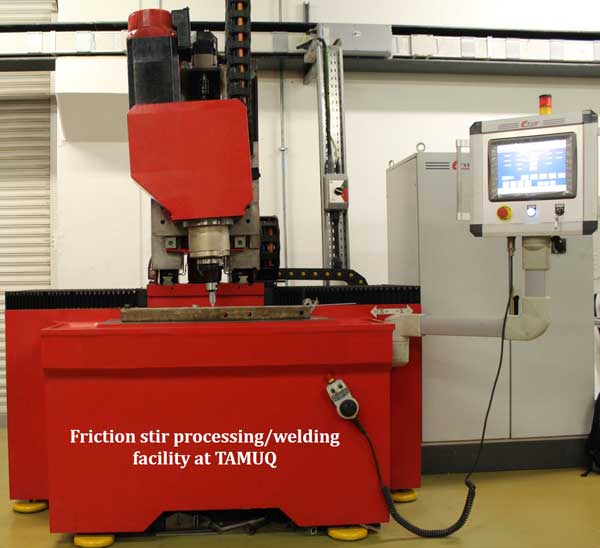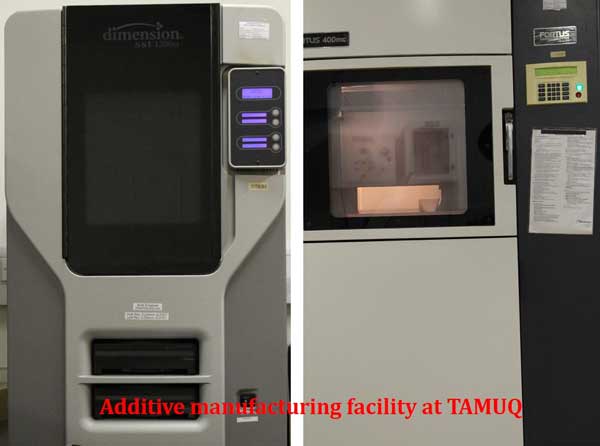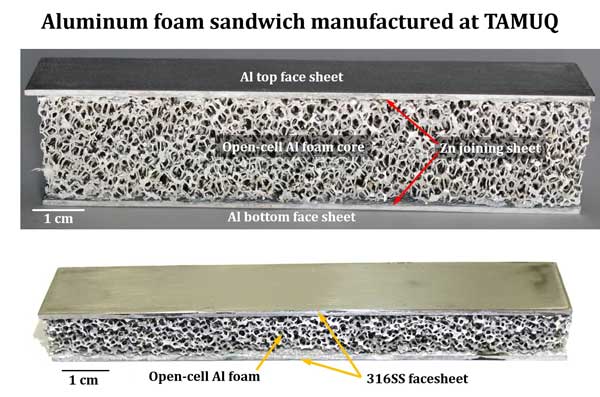Manufacturing for the Future: Towards Competitive Demand-Driven Qatar Industry
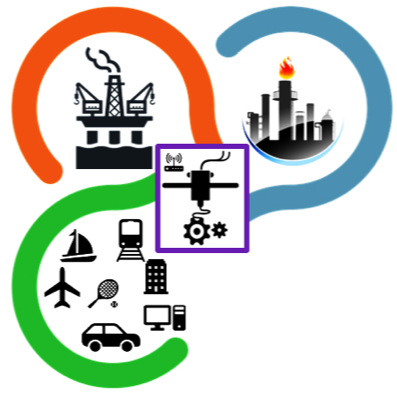


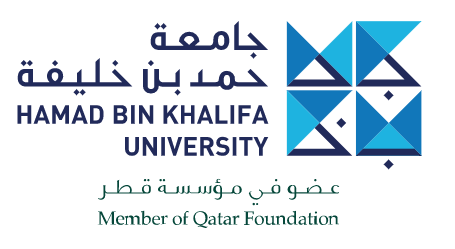

To register please email vasanth.shunmugasamy@qatar.tamu.edu
Friction stir processing/welding at Texas A&M at Qatar.
International Workshop on
"Manufacturing for the Future: Towards Competitive Demand-Driven Qatar Industry”
Hosted by:
Mechanical Engineering Program, Texas A&M University at Qatar
Venue: Room 310,
Engineering Building, Texas A&M University at Qatar, Education City
April 3 – 4, 2018
Organizing Committee
Dr. Satish Bukkapatnam, Texas A&M University
Dr. Mohamed El Mansori, ENSAM
Dr. Marwan Khraisheh, Hamad bin Khalifa University
Dr. Bilal Mansoor, Texas A&M University at Qatar
Dr. Eyad Masad, Texas A&M University at Qatar
Dr. Vasanth C. Shunmugasamy, Technical Program Coordinator, Texas A&M University at Qatar
Summary
The two-day workshop will help identify advanced manufacturing research needs of the State of Qatar from both technological (e.g., 3-D printing, adapting manufacturing, and Smart platforms) as well as systemic (e.g., supply chains and the Internet of Things) fronts. The goal is to help improve the quality and global competitiveness of Qatar industry with focus on smart manufacturing to transform the critical sectors of Qatar including oil and gas (upstream drilling and transport), secondary value-added products (e.g., steel, aluminum, polymer production), and critical supply chains (e.g., food-security initiative).
Workshop Focus
The two-day workshop will feature talks from diverse industry and academic experts. Experts drawn from various industry sectors critical to layout Qatar’s will articulate the emerging needs and grand challenges. Academic experts will layout the technology frontiers in the relevant areas to offer a bright future for Qatar manufacturing platforms. Together, they will outline the elements of a research roadmap for Qatar in advanced manufacturing to address these emerging needs.
The workshop will specifically aim to achieve the following objectives:
- Articulate Qatar-specific challenges and opportunities in advanced manufacturing
- Delineate the technologies and systems with the highest potential to address these challenges
- Outline a roadmap to advance smart manufacturing innovations to develop, tailor and demonstrate solutions to the grand challenges
Workshop Themes
The workshop will focus on research and innovations in (1) manufacturing technologies, and (2) manufacturing systems and supply chains.
A new manufacturing paradigm is needed for the following items:
- New models, simulation, big data, cloud and high-performance computing will enable functionally based designs. Thus, a component or system can be designed to meet its functional requirements in an optimal fashion. New designer materials (including non-homogeneous materials) will need to be manufactured to scale, as well as to be incorporated into the design process and design tools.
- Rapid adoption and certification of new processes, technologies and products. How do we move innovations from the laboratory into large-scale production more rapidly so that we can keep up with the pace of technological change?
- New design tools and design philosophy. This is particularly true with additive manufacturing. Finally, from a philosophy/educational perspective, we need to teach our students how to think differently with respect to the new design and manufacturing capabilities. Again, when one thinks of a hole, it no longer has to be a straight circular constant cross section configuration; additive manufacturing can produce many more configurations.
Oil & Gas
Clean oil and gas is likely to remain the largest and the most economical source of energy for a foreseeable future. Collaborative research initiatives are necessary to address key scientific and technological challenges in processing (e.g., drilling, finishing, and coating) of advanced materials, that are sought increasingly for oil and gas core infrastructure. In addition, recent advances in contemporary manufacturing technologies (e.g., additive, nano-manufacturing) offer a mostly untapped opportunity to create high value products (e.g., refractory housings, nanowire thermoelectric) out of oil and gas by-products that are generally treated as waste in the value chains (e.g., steel slag and sulfuric compounds). These technologies thus lead to an exciting possibility of transforming the oil and gas sector into a net-zero material footprint industry. Some possible research areas include Energy efficient technologies and operational procedures for oil and gas production, Smart drilling and well technology, Advanced exploration technologies, Efficient and enhanced oil recovery, Offshore and subsea manufacturing and operations, downstream and secondary industries, Advanced pipeline and transport systems.
Downstream Products
The natural resources as well as its strategic location offer Qatar the potential to be a world leader in primary processing of metals, including Aluminum and Steel. Advent of smart manufacturing is transforming this industry into lean enterprises that can produce alloys on demand at high efficiencies and performance. Challenges inherent to the introduction of smart manufacturing technologies for primary processing of these materials, as well as towards enhancement of metal processing value chains to create high value products of strategic importance to Qatar will be discussed. Here, rapid adoption and certification of new processes, technologies and products will be critical to realizing this vision for Qatar. How do we move innovations from the laboratory into large-scale production more rapidly so that we can keep up with the pace of technological change?
Critical Supply Chains
Qatar relies heavily on expensive desalination processes to produce water for both drinking and agriculture. On the other hand, the cultivation of crops is already a challenging proposition for the State of Qatar due to the lack of arable land. This substantial reliance on foreign food imports, e.g. drinking water, grains and processed food items has made the State of Qatar vulnerable to manufacturing supply chain issues that may arise due to fluctuations in international commodity markets
Workshop Deliverable
In every session of the workshop, at least one organizing committee member will serve as a scribe. The participants will work together at the end of the workshop to utilize the notes and put together a white paper about the future of research and innovation of the manufacturing industry in Qatar.
Presentations purpose:
Each Presenter will address the following questions to the extent possible:
- What are the challenges/needs?
- What are the major opportunities?
- What are the new technologies/ideas?
- What are you doing for investigating and developing these emerging technologies? Where is the excitement?
We hope you enjoy the workshop.
Download the workshop program here.
In addition to the list of participants above, several faculty members and students from Texas A&M at Qatar will attend this workshop and participate in the discussions.
Contact
Dr. Eyad Masad, P.E.
Zachry Professor
Texas A&M University at Qatar
Tel.: +974 4423 0268
eyad.masad@qatar.tamu.edu
Dr. Bilal Mansoor, Assistant Professor
Tel.: +974 4423.0240
Email: bilal.mansoor@qatar.tamu.edu
Dr. Vasanth Shunmugasamy, Postdoctoral Research Associate
Tel.: +974.4423.0650
Email: vasanth.shunmugasamy@qatar.tamu.edu
Directions and parking:
.jpg)
.jpg)
